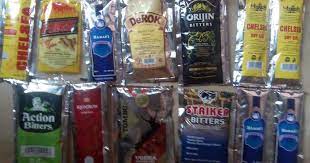
Given the global and local market size of spirit drinks, the National Agency for Food and Drugs Administration (NAFDAC)’s decision to prohibit the production, distribution, sales, and consumption of alcoholic drinks packaged in sachets and PET bottles has been criticized as a move that could worsen Nigeria’s economic woes. Earlier this year, NAFDAC began enforcing the ban by shutting down some factories producing these sachet drinks, following the expiration of a five-year ultimatum for their phase-out.
Since the ban’s implementation, it has faced significant opposition from various stakeholders, including the Manufacturers Association of Nigeria, Distillers and Blenders Association of Nigeria, Civil Society Organizations, and others, all citing the ban’s economic implications for the country.
Analysts previously projected the market size of alcoholic drinks to reach $204 billion in the United States and $49.9 billion in Nigeria by 2024, with spirit drinks packaged in sachets and PET bottles playing a crucial role in Nigeria’s market. Unlike in developed economies, where spirit drinks are mainly sold in packaged bottles due to better economic conditions and purchasing power, Nigeria and other African countries rely heavily on sachet and PET bottles.
The ban threatens consumers’ purchasing power in Nigeria, already eroded by soaring inflation, as sachet and PET bottles offer affordability and accessibility. Consequently, industry players anticipate a shift in consumer preferences towards other alcoholic beverages or non-alcoholic alternatives, potentially causing revenue losses for sachet drink producers while benefiting other segments of the alcoholic beverage industry.
The Manufacturers Association of Nigeria estimates that the ban will result in the loss of over ₦800 billion in investment and the closure of about 25 companies. Additionally, over 50 million Nigerians employed in this sector may lose their jobs. The government is warned of the ban’s adverse effects on revenue generation, given that a large percentage of consumers prefer sachet drinks, contributing significantly to the sector. Moreover, sachet alcoholic drinks are subject to excise taxes and other levies, contributing to government revenue.
Banning sachet alcoholic drinks may lead to increased enforcement costs for the government, including monitoring compliance, tackling illicit production and smuggling, and addressing potential black market activities. This would further strain government resources and administrative capacity.
The decision comes amid broader socio-economic challenges, including poverty and high living costs. While aiming to reduce alcohol-related harm, the ban’s impact on vulnerable populations, including those dependent on sachet drinks for livelihoods, must be carefully considered. Addressing the root causes of harmful drinking behaviors requires a comprehensive approach beyond regulatory measures.
NAFDAC is urged to consider the economic complexity surrounding the ban on sachet alcoholic drinks, taking into account consumer behavior, industry dynamics, regulatory costs, government revenues, and socio-economic considerations. Implementing effective alcohol control strategies that balance public health objectives, economic realities, and social equity concerns is essential for achieving sustainable outcomes for all stakeholders.








